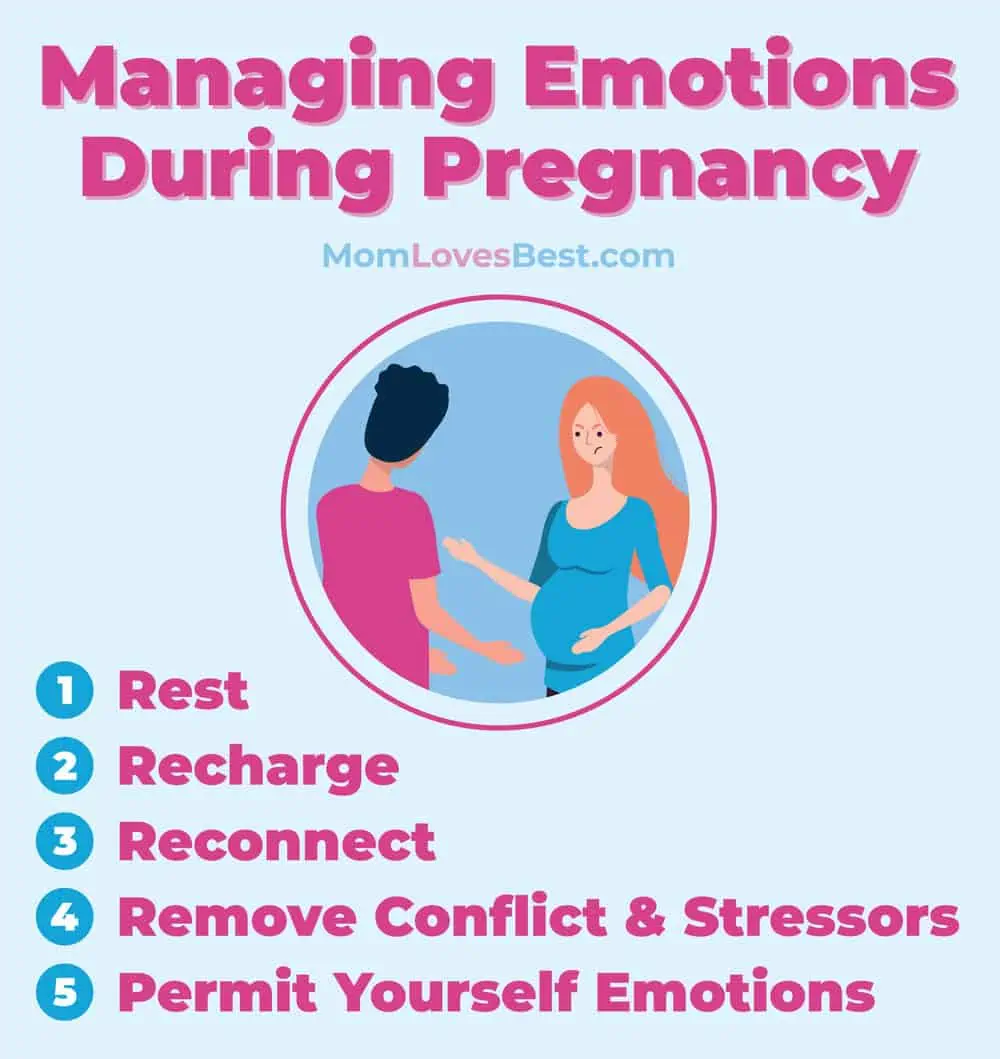Are you pregnant and struggling to control your temper? Pregnancy is a very special time in a woman’s life — a time with so many emotions. While we often talk about the joy and excitement of expecting, we shy away from addressing the other feelings.
Expectant moms often also experience anxiety, worry, and even anger. We know because we’ve been there, and we’ve spoken with countless other pregnant moms who have been there too. We understand how these feelings can be overwhelming.
If you want to avoid spending the next nine months feeling like a volcano on the verge of eruption, keep reading. We’ve spoken with experts and created this guide, including a simple five-step process to managing your anger during pregnancy.
Key Takeaways
- Pregnancy is a time of many emotions, and it’s normal for expectant mothers to experience anxiety, worry, and anger.
- Hormones and stress are common causes of anger during pregnancy.
- It’s important to distinguish between normal mood swings and a more serious situation. Consult a healthcare provider if anger and mood swings are consistently increasing in frequency, intensity, or duration and interfering with relationships or daily life.
- Anger and stress can have negative effects on both the mother’s and the baby’s health.
- Tips for managing emotions during pregnancy include: getting enough rest, recharging through activities that bring joy, practicing mindfulness, seeking support, and seeking professional help if needed.
Why Am I So Angry During Pregnancy?
The most common cause of extreme emotional responses during pregnancy is hormones. Your hormones tend to fluctuate as your body enters the first trimester and changes to support the growing life inside you.
This can lead to more intense feelings, conflicting emotions, and frequent mood swings.
Another common cause of anger in pregnancy is good ol’ stress.
There are few events in life as life-changing as welcoming a new child into your family. As exciting as it is, the transitions and stress of the unknown can also cause tensions to run high and impact your ability to control your anger during your pregnancy.
When Should I Consult My Doctor?
Expect a few stress or hormone-induced outbursts of anger during pregnancies. Stress and anger are not only a part of pregnancy but part of any human existence.
The key is identifying the difference between normal hormonal moods and a more serious situation. The baseline emotional state varies from person to person, so you and your loved ones are key to determining what is normal for you and what might need to be addressed by a professional.
Take Note
Anger And Your Baby’s Health
Anger and anxiety trigger stress hormones, including cortisol, and can send your body and mind into “fight or flight” mode. A continuous stress response (as opposed to periodic elevations), can trigger an inflammatory response in your nervous system.
Take Note
It may be hard to stop stressing once you know the impact of stress. But remember, stressing about your stress levels and anger will not make them go away. Instead, use this information as motivation to implement some changes to handle your emotions better.
Managing Emotions During Pregnancy
1. Rest
This is often a hard one for busy moms, especially if you work outside the home or have older children to care for in addition to your growing belly.
Although it can be tempting to stay up late to get everything done and stay on the go all day long, don’t fall into this trap. It can be incredibly taxing on your body which is already under strain.
Prioritize your body’s need for rest by aiming for these milestones throughout the day:
- Ten minutes of rest for every hour of being on your feet.
- A 20-30 minute nap whenever possible.
- Seven to eight hours of quality undisturbed sleep every night.
These will help you maintain your energy levels and minimize the physical discomforts of pregnancy such as swollen feet, back pain, and headaches, so they don’t add to your irritability.
2. Recharge
Remember the age-old adage of putting on your oxygen mask before assisting others? They say it on airplane journeys, and it certainly applies to the journey of pregnancy as well.
The growing life inside you is literally draining you (and we mean that in the nicest way possible). Be sure to fuel your body frequently with healthy foods so you can have energy throughout the day.
Remember
Keeping up a regular, mild exercise routine is an important element. Exercise helps to manage your stress hormones, release feel-good endorphins, and alleviate physical symptoms such as constipation and insomnia.
Aim for the following recharging activities throughout the day:
- 20-30 minutes of mild physical exercise (gardening, swimming, walking).
- Small 300-400 calorie, nutrient-dense meals or snacks five to six times per day.
3. Reconnect
While you and your partner are both focused on preparing for your baby, don’t let your relationship slide. Make time to connect on an emotional level.
Take Note
Pregnancy is also a great time to reconnect with yourself and continue to pursue your interests. Taking time for personal hobbies you enjoy enables you to maintain emotional balance.
Whatever your downtime is — reading, prenatal yoga, painting, 5-10 minutes of morning meditation — do what you can to create those experiences for yourself and make sure you remain a priority on your to-do list.
4. Remove Conflict and Stress
Try as much as possible to remove yourself from stressful situations. If you have older kids testing limits or a strenuous job, you can’t just walk away for the next nine months.
However, you can identify a few isolated conflict-inducing incidents and choose a different approach to handling them.
Whether it’s a problematic co-worker or your toddler throwing a tantrum, if you’re upset, it is perfectly acceptable to take a break before you discuss the issue.
Give yourself a few moments to regain composure, and focus on another activity (walking, reading, deep breaths) to calm you down.
You may also reduce stress by removing unnecessary items from your to-do list. This might decrease your level of anxiety and feelings of being overwhelmed.
5. Release
Release the expectation to be happy and joyful about this pregnancy 24/7. As moms, we don’t often discuss these negative emotions because we worry that people will think we aren’t excited to be pregnant or are taking for granted this blessing in our lives.
Pregnancy can be difficult! Permit yourself to feel these emotions without judgment.
Take Note
Making a list of your concerns or writing your emotions in a pregnancy journal can help you accept the emotions as normal and give you some relief.
If you decide to confide in someone else, choose a trusted friend you know will be supportive and empathetic. If you are journaling, give yourself grace.
FAQs
Getting A Grip On Anger
As a society, we’re finally beginning to recognize and speak about postpartum depression and anxiety. However, some conditions specifically occur during pregnancy. This is called antenatal depression or anxiety. It is less known but affects 7 to 20% of all pregnant women (3).
In my practice, I saw antenatal depression nearly as often as postpartum depression, yet mothers rarely discuss it.
If you are feeling more emotional, you are not alone! Most pregnant women feel emotions more intensely. If the anger turns into sadness or persists, you could be dealing with an antenatal mental health disorder. Seeking counseling is an effective way to improve your symptoms and take back your pregnancy. Let your healthcare provider know what your concerns are so that they can keep both of you safe.
Editor's Note:
Caitlin Goodwin, MSN, RN, CNMIf you’ve used these tips and still have trouble with your emotions, don’t put off a discussion with your healthcare provider! Just as you wouldn’t ignore a physical symptom, take care of your mental and emotional health.









